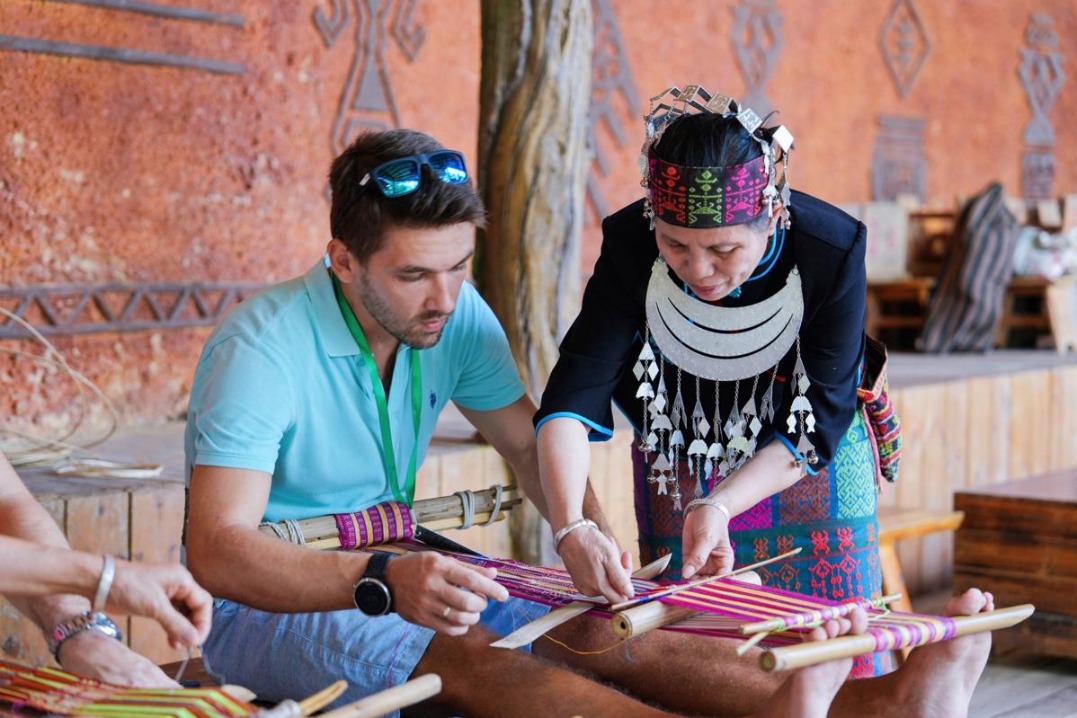Turning point
New milestone in China's relations with Arab countries has generated new opportunities for development of the Middle East

New milestone in China's relations with Arab countries has generated new opportunities for development of the Middle East

The world today is undergoing profound changes unseen in a century. The international landscape is being profoundly adjusted and the world situation is in a dramatic turbulence. The Middle East is an epitome of the world.
Since 1991 when the United States became the world's only superpower after the dissolution of the Soviet Union, the Middle East has experienced 30 years under US dominance. During this time, the US established all-around dominance over the region, deeply intervened in Middle Eastern affairs after the Sept 11 attacks in 2001 and launched wars in Afghanistan and Iraq, before eventually undergoing a strategic retrenchment.
In 2022, the Middle East entered the first year of multipolarity after the Russia-Ukraine conflict triggered significant changes in the region.
On the one hand, major powers in the world are giving more attention to the Middle East. Russia, now under unprecedented sanctions from the US and Europe, has started to rebalance toward the southeast. Europe's energy gap left by the Russia-Ukraine conflict can only be filled by oil and gas from the Middle East, especially the Gulf region.
On the other hand, Middle Eastern countries have grown more autonomous and independent and have greater space for strategic maneuver. This has led to adjustments in the relations among major countries and a de-escalation trend in the region.
For example, the Gulf states have ended the diplomatic crisis with Qatar, and the Gulf Cooperation Council has resumed normal operations; Turkiye's relations with Israel, Egypt and Saudi Arabia have all improved; and in October 2022, OPEC+, led by Saudi Arabia, decided against the wishes of the US to significantly cut oil production.
Notably, on March 10, Saudi Arabia, Iran and China issued a joint statement in Beijing to announce that Saudi Arabia and Iran would reopen their embassies and missions within two months, which triggered waves of reconciliation in the Middle East. Saudi Arabia and Syria have had frequent official interactions, and Arab countries have begun the process of bringing Syria back into the Arab League.
At the same time, the Yemen crisis has seen a turning point. A Saudi official delegation accompanied by an Omani official delegation visited the Yemeni capital Sanaa, which is controlled by the Houthi militia. The Saudi delegation was received by a high standard and the two sides held negotiations on a permanent cease-fire, opening the door to a political solution to the Yemen crisis.
The development of China's relations with Arab countries has brought about new opportunities for the promotion of the Belt and Road Initiative in the Middle East.
From Dec 7 to 10, 2022, Chinese President Xi Jinping visited Saudi Arabia and successfully held the Three Rings Summit. The first of its kind in the histories of China and Arab countries, the visit was the largest and highest-level diplomatic mission that China has ever taken toward the Arab world since the founding of the People's Republic of China. It became a milestone in the history of the development of China-Arab relations and demonstrated a strong signal that the two sides will elevate their strategic partnership to a new height.
The first China-Arab Summit and the first China-Gulf Cooperation Council Summit are the results of deepened cooperation between China and Arab countries across various fields and are expected to further accelerate the development of partnerships.
China-Arab strategic mutual trust has been further deepened: the "Riyadh Declaration of the First China-Arab Summit" announced that China and the Arab states agreed to build a China-Arab community with a shared future for the new era; the China-GCC Summit decided to establish and strengthen a China-GCC strategic partnership.
The summits have also advanced China-Arab economic and trade cooperation in energy, food security, 5G technology, artificial intelligence, aviation and space. Furthermore, the two sides will further expand personnel exchanges, deepen cultural-related collaboration, conduct exchanges of governance experience, and work to create new highlights of language and cultural education.
President Xi's visit to the Middle East has further consolidated the consensus between China and Arab countries on major issues such as global governance, development and security, and dialogue among civilizations, providing new impetus to the upgrading and improvement of relations between China and Middle Eastern countries.
China is now the largest trading partner of the Arab world. Total trade increased from $36.7 billion in 2004, when the China-Arab States Cooperation Forum was launched, to $431.44 billion in 2022, with an average annual growth rate of 14.7 percent, which was 4.8 percentage points higher than the overall growth rate of China's foreign trade during the same period. The share of China-Arab trade in China's total foreign trade has increased from 3.2 percent to 6.8 percent.
Notably, the trade volume between China and Arab countries in 2022 grew by 30.66 percent year-on-year, which was 26 percentage points higher than the overall growth rate of China's foreign trade during the same period and a new historic high in China-Arab trade. At the same time, China-Arab trade and investment is witnessing robust growth, with important partnerships in traditional sectors such as energy and infrastructure, as well as deepened cooperation in the digital, green development and high-tech sectors.
In a world characterized by heated competition among major powers, a global energy transition and new opportunities for economic growth, the significance of China-Arab economic and trade cooperation is ever more prominent. Shortly after the Chinese New Year in 2023, quite a few trade delegations from different places of China visited Saudi Arabia and the United Arab Emirates to explore business partnerships.
As the impacts of the COVID-19 pandemic fades, Chinese companies are ramping up overseas investment and trade in the Arab markets, bringing mature business models and technology, sharing opportunities and setting new bench marks for globalization. In March, the Export-Import Bank of China and the Saudi National Bank successfully landed the first loan cooperation in the renminbi, facilitating the trade between China and Saudi Arabia and helping promote financial integration and trade connectivity for countries under the Belt and Road Initiative.
In the future, China-Arab economic and trade cooperation is expected to further expand to areas such as building the "Green Silk Road", financial investment cooperation to promote the internationalization of the renminbi, innovative development and digital transformation empowered by technology. The new partnerships are expected to make greater contributions to the economic development and well-being of both China and Arab states.

The author is the director of the China Institute for Arab Countries at Ningxia University. The author contributed this article to China Watch, a think tank powered by China Daily.
Contact the editor at editor@chinawatch.cn.


































